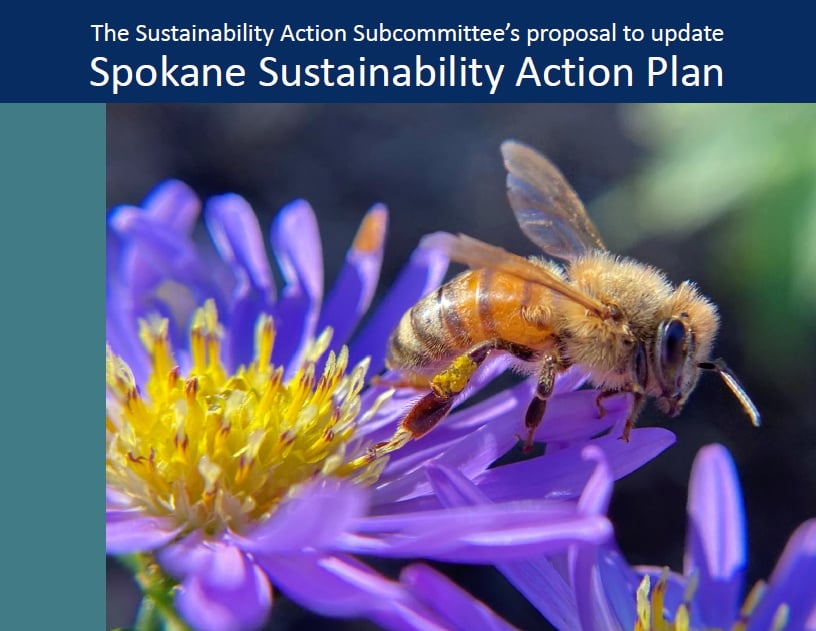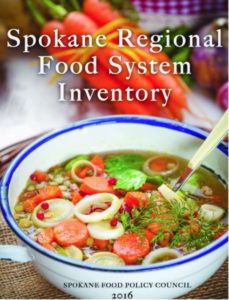 The Sustainability Action Subcommittee of the Spokane City Council, with input and engagement from dozens of local, regional, and national experts, has drafted a Sustainability Action Plan (SAP). The Spokane Food Policy Council enthusiastically supports the draft with some suggested changes. The city administration needs to know that there is strong support for the draft from the public.
The Sustainability Action Subcommittee of the Spokane City Council, with input and engagement from dozens of local, regional, and national experts, has drafted a Sustainability Action Plan (SAP). The Spokane Food Policy Council enthusiastically supports the draft with some suggested changes. The city administration needs to know that there is strong support for the draft from the public.
Let your voice be heard by taking the draft SAP survey!
The Spokane Food Policy Council’s letter of support for the draft plan is
reproduced below.


Ms. Kara Odegard
City Council Manager of Sustainability Initiatives City of Spokane
808 W. Spokane Falls Blvd.
Spokane, WA 99201
August 20, 2021
Dear Ms. Odegard,
The Spokane Food Policy Council would like to express our enthusiastic support for the City of Spokane’s draft Sustainability Action Plan. The Spokane Food Policy Council works to advance policies and initiatives that foster a resilient food system in the Spokane area; one that is healthy and equitable for its residents, economy and environment. We are encouraged by the high-profile recognition of the importance of food system issues in the city’s long range sustainability planning. In our opinion, the plan is a good beginning in addressing the objectives of our mission.
In 2020 and 2021, the Spokane Food Policy Council has been focused on developing a regional food action plan to help address four areas of the food system including farmland preservation, local food processing, healthy food for all, and food waste reduction. The draft Sustainability Action Plan coordinates with our work in the sections below and we would like to be included in future conversations and work.
Transportation & Land Use
|
Priority Action |
Comments/Proposed Changes |
|
|
TL 8.1 |
Audit the Comprehensive Plan for opportunities to include sustainability into policy language |
SFPC supports this work and would like to be involved in this process. |
|
TL 8.2 |
Bring forward amendments to the comprehensive plan during the annual update cycle where opportunities exist to integrate sustainability into comprehensive plan goals, policies and discussions prior to the 2026 major update |
SFPC supports this work and would like to be involved in this process. |
|
TL 8.3 |
Ensure SAS is a stakeholder in the 2026 Comp Plan major update process |
SFPC supports this work and would like to be involved in this process.. |
|
TL 8.4 |
Update City codes and planning documents to ensure preservation of urban farmland |
SFPC supports this work and would like to be involved in this process. |
Water Resources
|
Priority Action |
Comments/Proposed Changes |
|
|
Strategy 2. |
Protect and build climate resilience in streams, shorelines, aquifer, wetlands, and floodplains through responsible watershed planning |
Add “farmland” |
|
WR 2.1 |
Protect the following sensitive resources through acquiring, maintaining, and restoring strategies: wetlands, vital fisheries areas, terrestrial wildlife habitat and agricultural lands |
Add language to this section to prevent further loss of salmon habitat. |
|
WR 4.5 |
Update City water extension amendment process to prevent loss of critical natural areas, wetlands, |
Delete “and” Add “and working farms” |
|
Pg. 54 |
Co-Benefits Section |
Add: Water conservation encourages regenerative agricultural practices which save water, support local food production and food security. |
Economic Prosperity
|
Priority Action |
Comments/Proposed Changes |
|
|
EP 1.3 |
Partner with regional and neighborhood business associations to develop resiliency plans for specific sectors of our economy, including retail, hospitality, nonprofit, and food processing & supply |
SFPC supports this work and would like to be involved in this process. |
|
EP 1.8 |
Work with regional partners to conduct an analysis on supply chain dependability and develop plan to prioritize regional supply and infrastructure |
SFPC supports this work and would like to be involved in this process. |
|
EP 2.2 |
Create public, private partnerships to pilot programs for waste diversion including reducing food waste, expanding commercial composting, and developing programs to address hard to recycle materials |
SFPC supports this work and would like to be involved in this process. |
Natural Environment
|
Priority Action |
Comments/Proposed Changes |
|
|
Pg. 67 |
Improves livability measures, supports value added strategies that keep natural resource industry by-products (agriculture, forestry) in our local markets, and supports a visitor economy. |
Rewrite to “Improves livability measures and community well-being as wells as the visitor economy by supporting natural resource industries including local markets for regenerative agriculture and sustainable forestry products.” |
|
Pg. 68 |
Add “The City recognizes the increased importance of local and regional agricultural producers.” |
|
|
Strategy 1 |
Add: “Create an inventory of arable land and prioritize their protection.” |
|
|
Strategy 2 |
Add “Conserving agricultural and potentially arable lands within the City and the region.” |
|
|
NE 1.4 |
Establish land use planning and zoning policies that protect natural resources within City owned properties, prioritizing undeveloped Natural Areas |
SFPC supports this work and would like to be involved in this process. |
|
NE 5.3 |
Develop a Pollinator Gardens Program to establish habitat for our local pollinators, and provide education to the public about the critical role they play in the ecosystem (by 2022) |
SFPC supports this work and would like to be involved in this process. |
|
Strategy 6 |
Add – “Providing more support for community gardens (financial, land, in-kind).” |
Waste Diversion
|
Priority Action |
Comments/Proposed Changes |
|
|
WD 1.1 |
Work with businesses to develop systems for separation and collection of inedible food waste from other waste materials for composting |
SFPC supports this work and would like to be involved in this process. |
|
WD 1.3 |
Develop residential food waste collection and provision of composting bins to divert food waste from the Waste to Energy (WTE) plant |
SFPC supports this work and would like to be involved in this process. |
|
WD 2.1 |
Support diversion of excess edible food from commercial & institutional kitchens and grocery outlets to community members in need through food rescue programs |
SFPC supports this work and would like to be involved in this process. |
|
WD 2.2 |
Educate businesses and residents on the impacts of food waste and best practices to reduce it |
SFPC supports this work and would like to be involved in this process. |
Health and Well-being
|
Priority Action |
Comments/Proposed Changes |
|
|
HW 1.1 |
Support the Spokane Food Policy Council (SFPC) in studying, identifying and implementing sensible and achievable codes, policies, and requirements that eliminate barriers and reduce costs for urban farms and community gardens and expand local control of food grown, processed, and sold directly to consumers. |
SFPC supports this work and would like to be involved in this process. |
|
HW 1.2 |
Work with regional partners, including SFPC, to develop and adopt a Regional Food Plan. This document will outline the needs of the community and a blueprint for meeting these needs. |
SFPC supports this work and would like to be involved in this process. |
|
HW 1.3 |
Partner with local nonprofits, advocate groups, and other governmental organizations to create a Regional Food System Partnership. This partnership will bring stakeholders together to maximize our local food system capacity, efficacy, and efficiency. |
SFPC supports this work and would like to be involved in this process. |
|
HW 1.4 |
Partner with other public entities, local business organizations, and food producers to launch a local food campaign to educate the public on the benefits of eating local. |
SFPC supports this work and would like to be involved in this process. |
Proposed Glossary Definition
The draft Sustainability Action Plan uses the term ‘regenerative’ within the text. The SFPC applauds the inclusion of this relatively new long-range planning concept in the document. The concept is born out of a realization by scientists that many aspects of our environment and our society have been damaged by negligent and extractive land use and resource utilization policies and practices. These human-caused damages create major negative impacts to our climate, natural resources, natural ecosystems and human health and well-being. Humans are uniquely able to correct these errors. Through our actions we can not only heal the damage done but restore damaged systems. One of the ways this can be done is through the practice of regenerative agriculture. Regenerative agriculture builds healthy soil through conservation methods including increasing the organic matter content of agricultural soils which improves water retention, provide drought resilience, and sequesters carbon. Regenerative agriculture reduces the use of harmful agricultural chemicals which leads to healthier ecosystems and greater biodiversity. The SFPC envisions a future for our region where more and more producers are encouraged to practice regenerative agriculture.
The SFPC supports the Spokane draft Sustainability Action Plan, and we look forward to seeing this plan in action.
Sincerely,
Janell Harvey
Program Director – Spokane Food Policy Council



